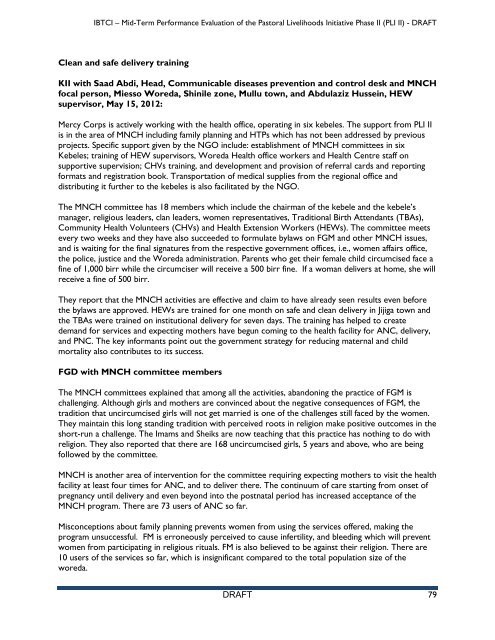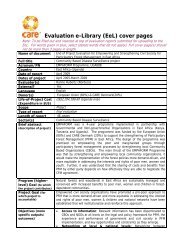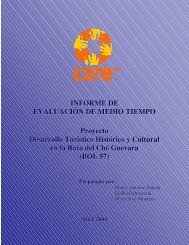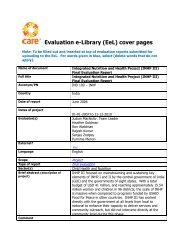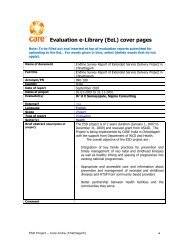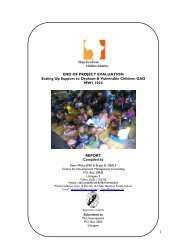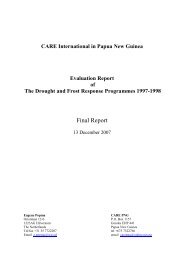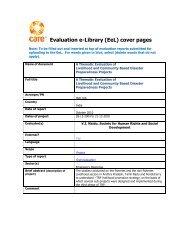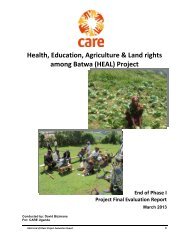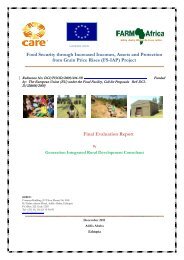Mid Term EVALUATION PLI II project - CARE International's ...
Mid Term EVALUATION PLI II project - CARE International's ...
Mid Term EVALUATION PLI II project - CARE International's ...
You also want an ePaper? Increase the reach of your titles
YUMPU automatically turns print PDFs into web optimized ePapers that Google loves.
IBTCI – <strong>Mid</strong>-<strong>Term</strong> Performance Evaluation of the Pastoral Livelihoods Initiative Phase <strong>II</strong> (<strong>PLI</strong> <strong>II</strong>) - DRAFT<br />
Clean and safe delivery training<br />
K<strong>II</strong> with Saad Abdi, Head, Communicable diseases prevention and control desk and MNCH<br />
focal person, Miesso Woreda, Shinile zone, Mullu town, and Abdulaziz Hussein, HEW<br />
supervisor, May 15, 2012:<br />
Mercy Corps is actively working with the health office, operating in six kebeles. The support from <strong>PLI</strong> <strong>II</strong><br />
is in the area of MNCH including family planning and HTPs which has not been addressed by previous<br />
<strong>project</strong>s. Specific support given by the NGO include: establishment of MNCH committees in six<br />
Kebeles; training of HEW supervisors, Woreda Health office workers and Health Centre staff on<br />
supportive supervision; CHVs training, and development and provision of referral cards and reporting<br />
formats and registration book. Transportation of medical supplies from the regional office and<br />
distributing it further to the kebeles is also facilitated by the NGO.<br />
The MNCH committee has 18 members which include the chairman of the kebele and the kebele’s<br />
manager, religious leaders, clan leaders, women representatives, Traditional Birth Attendants (TBAs),<br />
Community Health Volunteers (CHVs) and Health Extension Workers (HEWs). The committee meets<br />
every two weeks and they have also succeeded to formulate bylaws on FGM and other MNCH issues,<br />
and is waiting for the final signatures from the respective government offices, i.e., women affairs office,<br />
the police, justice and the Woreda administration. Parents who get their female child circumcised face a<br />
fine of 1,000 birr while the circumciser will receive a 500 birr fine. If a woman delivers at home, she will<br />
receive a fine of 500 birr.<br />
They report that the MNCH activities are effective and claim to have already seen results even before<br />
the bylaws are approved. HEWs are trained for one month on safe and clean delivery in Jijiga town and<br />
the TBAs were trained on institutional delivery for seven days. The training has helped to create<br />
demand for services and expecting mothers have begun coming to the health facility for ANC, delivery,<br />
and PNC. The key informants point out the government strategy for reducing maternal and child<br />
mortality also contributes to its success.<br />
FGD with MNCH committee members<br />
The MNCH committees explained that among all the activities, abandoning the practice of FGM is<br />
challenging. Although girls and mothers are convinced about the negative consequences of FGM, the<br />
tradition that uncircumcised girls will not get married is one of the challenges still faced by the women.<br />
They maintain this long standing tradition with perceived roots in religion make positive outcomes in the<br />
short-run a challenge. The Imams and Sheiks are now teaching that this practice has nothing to do with<br />
religion. They also reported that there are 168 uncircumcised girls, 5 years and above, who are being<br />
followed by the committee.<br />
MNCH is another area of intervention for the committee requiring expecting mothers to visit the health<br />
facility at least four times for ANC, and to deliver there. The continuum of care starting from onset of<br />
pregnancy until delivery and even beyond into the postnatal period has increased acceptance of the<br />
MNCH program. There are 73 users of ANC so far.<br />
Misconceptions about family planning prevents women from using the services offered, making the<br />
program unsuccessful. FM is erroneously perceived to cause infertility, and bleeding which will prevent<br />
women from participating in religious rituals. FM is also believed to be against their religion. There are<br />
10 users of the services so far, which is insignificant compared to the total population size of the<br />
woreda.<br />
DRAFT 79


